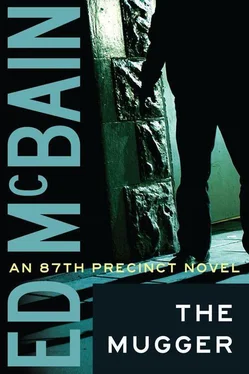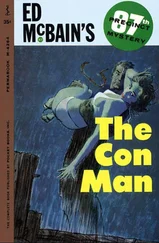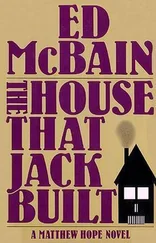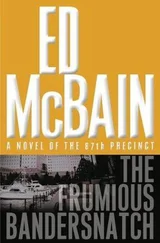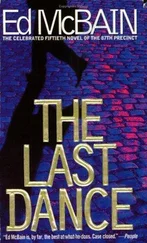“Yes,” Claire said gently. “Yes.”
“But not Jeannie Paige. Dammit, why not her?”
“I don’t know.” Claire thought for a moment. “This mugger who killed her—”
“Um?”
“The police don’t think he was the fellow she was seeing, do they?”
“This is the first anyone connected with the police is hearing about her love life,” Kling said.
“Oh. Well, he… he didn’t sound that way. He sounded gentle. I mean, when Jeannie did talk about him, he sounded gentle.”
“But she never mentioned his name?”
“No. I’m sorry.”
Kling rose. “I’d better be going. That is dinner I smell, isn’t it?”
“My father’ll be home soon,” Claire said. “Mom is dead. I whip something up when I get home from school.”
“Every night?” Kling asked.
“What? I’m sorry…”
He didn’t know whether to press it or not. She hadn’t heard him, and he could easily have shrugged his comment aside. But he chose not to.
“I said, ‘Every night?’”
“Every night what?”
She certainly was not making it easy for him. “Do you prepare supper every night? Or do you occasionally get a night off?”
“Oh, I get nights off,” Claire said.
“Maybe you’d enjoy dinner out some night?”
“With you, do you mean?”
“Well, yes. Yes, that’s what I had in mind.”
Claire Townsend looked at him long and hard. At last, she said, “No, I don’t think so. I’m sorry. Thanks. I couldn’t.”
“Well… uh…” Quite suddenly, Kling felt like a fool. “I… uh… guess I’ll be going, then. Thanks for the cognac. It was very nice.”
“Yes,” she said, and he remembered her discussing people who were there and yet not there, and he knew exactly what she meant because she was not there at all. She was somewhere far away, and he wished he knew where. With sudden, desperate longing, he wished he knew where she was because, curiously, he wanted to be there with her.
“Good-bye,” he said.
She smiled in answer and closed the door behind him.
The dime in the slot brought him Peter Bell.
Bell’s voice was sleepy. “I didn’t wake you, did I?” Kling asked.
“Yes, you did,” Bell said, “but that’s all right. What is it, Bert?”
“Well, is Molly there?”
“Molly? No. She went down to pick up a few things. What is it?”
“I’ve been… Well, she asked me to check around a little.”
“Oh? Did she?”
“Yeah. I went to Club Tempo this afternoon, and I also talked with a girl named Claire Townsend. Nice girl.”
“What did you find out, Bert?”
“That Jeannie was seeing some guy regularly.”
“Who?”
“Well, that’s just it. Miss Townsend didn’t know. She ever mention anybody’s name to you or Molly?”
“No, not that I can remember.”
“That’s too bad. Might give me something to go on, you know, if we had even a first name. Something to work with.”
“No,” Bell said, “I’m sorry, but…” He stopped dead. There was a painful silence on the line, and then he said, “Oh my God!”
“What’s the matter?”
“She did, Bert. She did mention someone. Oh my God!”
“Who? When was this?”
“We were talking once. She was in a good mood, and she told me… Bert, she told me the name of the fellow she was seeing.”
“What was the name?”
“Clifford! My God, Bert! His name is Clifford!”
It was Roger Havilland who brought in the first real suspect in the alleged mugger murder.
The suspect was a kid named Sixto Fangez, a Puerto Rican boy who had been in the city for a little more than two years. Sixto was twenty years old and had, until recently, been a member of a street gang known as “The Tornadoes.” He was no longer active, having retired in favor of marriage to a girl named Angelita. Angelita was pregnant.
Sixto had allegedly beat up a hooker and stolen $32 from her purse. The girl was one of the better-known prostitutes in the precinct territory and had, in fact, rolled in the hay on a good many occasions with members of the legion in blue. Some of these policemen had paid her for the privilege of her company.
In ordinary circumstances, in spite of the fact that the girl had made a positive identification of Sixto Fangez, Havilland might have been willing to forget the whole matter in consideration of a little legal tender. Assault charges had been known to slip the minds of many policemen when the right word, together with the right amount of currency, was exchanged.
It happened, however, that the newspapers were giving a big play to the funeral of Jeannie Paige — a funeral which had been delayed by the extensive autopsy examination performed on the body — on the morning that Sixto was brought upstairs to the squadroom. The newspapers were also pressuring the cops to do something about the rampant mugger, and so perhaps Havilland’s extreme enthusiasm could have been forgiven.
He booked a bewildered and frightened Sixto, barked “Follow me!” over his shoulder, and then led him to a room politely marked INTERROGATION. Inside the room, Havilland locked the door and calmly lighted a cigarette. Sixto watched him. Havilland was a big man who, in his own words, “took nonsense from nobody.” He had once started to break up a street fight and, in turn, had his arm broken in four places. The healing process, considering the fact that the bones would not set properly the first time and had to be rebroken and reset, was a painful thing to bear. The healing process had given Havilland a lot of time to think. He thought mostly about being a good cop. He thought also about survival. He formed a philosophy.
Sixto was totally unaware of the thinking process that had led to the formation of Havilland’s credo. He only knew that Havilland was the most hated and most feared cop in the barrio. He watched him with interest, a light film of sweat beading his thin upper lip. His eyes never left Havilland’s hands.
“Looks like you’re in a little trouble, huh, Sixto?” Havilland said.
Sixto nodded, his eyes blinking. He wet his lips.
“Now, why’d you go and beat up on Carmen, huh?” Havilland said. He leaned against the table in the room, leisurely blowing out a stream of smoke.
Sixto, thin, birdlike, wiped his bony hands on the coarse tweed of his trousers. Carmen was the prostitute he’d allegedly mugged. He knew that she had, on occasion, been friendly with the bulls. He did not know the extent of her relationship with Havilland. He maintained a calculating silence.
“Huh?” Havilland asked pleasantly, his voice unusually soft. “Now, why’d you go and beat up on a nice-looking little girl like Carmen?”
Sixto remained silent.
“Were you looking for some trim, huh, Sixto?”
“I am married,” Sixto said formally.
“Looking for a little gash, huh, Sixto?”
“No, I am married. I don’t go to the prostitutes,” Sixto said.
“What were you doing with Carmen, then?”
“She owe me money,” Sixto said. “I went to collec’ it.”
“You lent her money, is that right, Sixto?”
“Si,” Sixto said.
“How much money?”
“Abou’ forty dollars.”
“And so you went to her and tried to collect it, is that right?”
“Si. Iss my money. I lenn it to her maybe three, maybe four munns ago.”
“Why’d she need it, Sixto?”
“Hell, she’s a junkie. Don’t you know that?”
“I heard something along those lines,” Havilland said, smiling pleasantly. “So she needed a fix and she came to you for the loot, that right, Sixto?”
“She dinn come to me. I happen to be sittin’ in the bar, an’ she say she wass low, so I lay the forty on her. Thass all. So now I wenn aroun’ to collec’ it. So she gave me a hard time.”
Читать дальше
